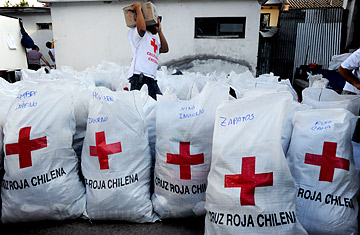
Aid workers in Santiago, Chile, sort donations of clothing for victims of the earthquake
The reports of looting in Chile's earthquake-ravaged cities run counter to the country's vaunted sense of Swiss-style order. But overconfidence may have tripped up the government as it sought to project its newly minted membership in the league of developed nations.
Indeed, attempted shows of competency sometimes seemed to hinder getting assistance out to the shattered communities. On Monday night, for example, a brigade of troops was delayed three hours so that President Michelle Bachelet could arrive to see them off. The troops themselves were rather green, according to Peter Murphy Lewis, an American professor of political science at the University of Chile, who flew to the badly hit city of Concepción in a Chilean air force Boeing 707 with 340 of the troops. "Many of the soldiers," he says, "were saying stuff like, 'Wow, we are so high! We are in the clouds!' They had never flown on a plane before ... It was a slightly surreal situation."
Surreal was the operative word. Even supporters of Bachelet like Lewis quickly realized that the task of helping the victims of the earthquake was going to be enormous. As the President herself told TIME, no one in command really knew how bad the situation was outside of Santiago because of the breakdown in communications and what turned out to be inaccurate information. On Wednesday, travel to and communications with Concepción, the big city closest to the 8.8-magnitude quake's epicenter, was still difficult. Lewis arrived there early Monday evening with the Chilean military to find a city that appeared to be completely abandoned. "It was like a ghost town," he tells TIME, "or a bad apocalyptic Hollywood movie. There was smoke from fires that were still raging. Street lamps and traffic lights are still not functioning. I would estimate that 40% of windows were broken, and perhaps 10% of buildings suffered seemingly catastrophic damage and were no longer inhabitable. People were sleeping in plazas and had made makeshift tents from shopping carts."
Concepción, which is adjacent to the Pacific Ocean, seems to have dodged the tsunami, but Lewis says that small towns north and south were badly hit by it. He says he was told by authorities that 350 deaths of the total death toll were the result of the tsunami in these small villages. Generally, the navy would have been the first to respond, but, says Lewis, "their base on the water was destroyed by the quake and tsunami, leaving them helpless."
Though Lewis says he saw no looting himself, the reports of looting generated a lot of fear. "In many neighborhoods on the outskirts of the city," he says, "people had set up barricades on their streets, using telephone posts, signs and trees that had fallen down. I saw a few people carrying sticks at these posts as makeshift weapons. I interviewed a man at the airport who said that some of these neighborhood watches had instituted passwords so as to identify the people who actually lived on their street." The Chilean army spent most of Wednesday locking down every block in Concepción.
Bachelet has taken to the airwaves to tell quake victims that there is no food or fuel shortage. But on Wednesday morning in Concepción, says Lewis, "there were thousands of stranded cars and trucks in the city because there is no gas." He adds, "Building up social trust is more important right now than physical rebuilding," perhaps because of the reign of terror under the 17-year military dictatorship of Augusto Pinochet. Chileans still have a wary relationship with security institutions — an instinct exacerbated by the post-quake inefficiencies of the government. "You can see it clearly in this crisis," says Lewis, "as rumors are circulating and causing panic." He does see some positive signs, though: "I saw families reunited, tearfully. I believe this is an opportunity for that trust to spread throughout society."
